The Big Read: Goodbye T-score, goodbye PSLE stress? Not so fast, as anxious parents size up new scoring system
SINGAPORE — Parents of Primary 6 pupils across the country heaved a collective sigh of relief last month when their children collected their Primary School Leaving Examination (PSLE) results, closing the chapter on what had been a particularly stressful year.
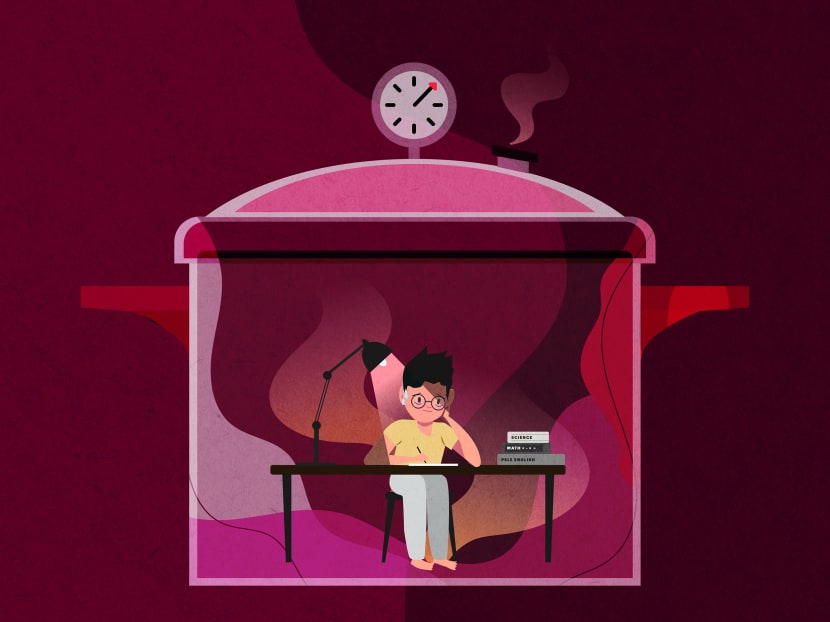
Parents of Primary 6 pupils across the country heaved a collective sigh of relief last month when their children collected their PSLE results, following a particularly stressful year due to disruptions brought on by Covid-19.
- The PSLE T-score system, which has been around for six decades and has partly become a source of stress of parents and children, will be scrapped after this year
- From 2021, pupils will be assigned Achievement Levels instead
- Teachers and some parents welcome the change, saying it reduces unhealthy competition
- But other parents are concerned that the new system could add to the stress, especially in its first year of implementation
- Experts say ultimately, it boils down to parents embracing the spirit of the changes
SINGAPORE — Parents of Primary 6 pupils across the country heaved a collective sigh of relief last month when their children collected their Primary School Leaving Examination (PSLE) results, closing the chapter on what had been a particularly stressful year.
The national exams have always been a source of anxiety for both parents and pupils each year, but the Covid-19 pandemic had brought with it a new set of challenges that made the race to the finishing line even more arduous.
One parent who survived the ordeal with “battle scars” to show is Ms Kelly Chen.
Initially, the 47-year-old chief operating officer of a vet clinic had not expected to be overly concerned or worried about her 12-year-old son’s preparations for the PSLE, long viewed as a high-stakes examination that could determine one’s academic future.
After all, when her eldest son took the exams two years ago, she was quite at ease. The mother-of-two could go about her daily activities, such as attending yoga lessons and having a meal with friends and family, with peace of mind.
But this year was different, Ms Chen said.
For one thing, the curriculum was disrupted earlier this year when schools closed to curb the spread of the coronavirus and lessons went online.
A full day of classes were crunched down to one 30-minute lesson each day, far shorter than the usual contact time that teachers would have with students in-person.
Because of this, teachers and pupils had to play catch up when physical lessons resumed.
For instance, teachers would usually finish teaching the Pri 6 syllabus by April and move on to revision and dishing out mock exam papers, said Ms Chen.
But this year, because of the pandemic, her son completed the syllabus only in July — less than three months before the actual exams in early October.
That was when the panic mode set in, said Ms Chen. She started to supervise her son more closely, even coming back about three hours earlier from work to ensure that the Rosyth School pupil was focused.
Even then, she could not help but feel anxious about whether her son would be able to achieve his goal of getting into NUS High School of Math and Science.
“I felt stressed because even though (my son) is the happy-go-lucky type, he still wants to go to his desired school and I didn’t want him to be disappointed later if he didn’t,” she said.
When it was finally over and her son managed to get into the school he wanted, Ms Chen could really feel that a weight had been lifted off her shoulders.
“I kept telling my son: ‘I finally can feel how you feel’,” she quipped.
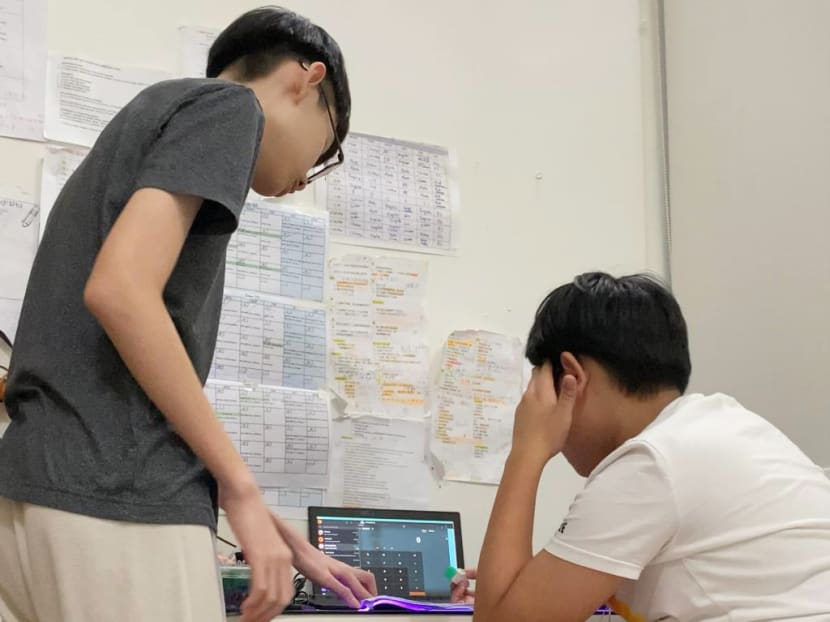
Other than crossing the first milestone in the education system here, Ms Chen’s son Hong Zen was also one of the final batch of 39,995 Pri 6 pupils who took the PSLE under the T-score system.
First introduced in 1960, the T-score system will be scrapped after this year as part of ongoing efforts to reform the educational system.
Replacing it from next year onwards will be a new scoring system where pupils are assigned Achievement Level (AL) scores from AL1, the best, to AL8, instead of the current alphabetical grades.
In the AL scoring system, a student’s score is not linked to his or her peers’ performance. This is unlike the T-score, which is calculated based on how well a student did in relation to others in the cohort.
When the changes were first announced in 2016, then-Acting Minister for Education (Schools) Ng Chee Meng said the new scoring system is intended to ease the pressure which students face in competing against their peers’ performance.
It will also be a better gauge of a child’s performance as pupils will no longer be as finely differentiated on the basis of every mark, said the Ministry of Education (MOE) then.
Despite the intention of the policymakers which was welcomed by parents in general, some parents whose children will be taking the national exams next year remain uncertain that the revamp will do much to change the pressure-cooker environment of the exam system.
For one, they do not quite know what to expect in the first year of the new scoring system’s implementation. This anxiety could see some parents becoming even more kiasu to make sure their kids do well. For these parents, better the devil you know, as the saying goes.
Nevertheless, for the parents of 12-year-olds taking the PSLE this year, nothing could quite prepare them for it, no matter how familiar they were with the old scoring system — given how the pandemic had severely disrupted all aspects of life as we know it.
PSLE IN THE TIME OF COVID-19
Like Ms Chen, other parents recounted how the coronavirus had thrown a spanner in the works, adding even more stress to students — and parents — preparing for the PSLE.
Ms Elaine Tan’s 12-year-old son also went through a “mad rush” to finish the entire Pri 6 syllabus due to the disruptions to physical lessons. As a result, the time for revision before the actual exams was compressed as well.
Because of this, the mother-son pair had to be more strategic in their exam preparations — placing emphasis on the major topics and question-spotting in order to cover as much ground as possible.
Adding to the anxiety was the fear of contracting the virus. Concerned that her son may be stricken with Covid-19 before the PSLE, the family chose to stay mostly at home to minimise their risk of being exposed to the coronavirus.
Making use of all the tools in her arsenal, Ms Tan also took advantage of her employer’s PSLE leave accommodation scheme, which lets employees with children taking the PSLE to carry forward up to 15 days of leave from the year before, to aid her son in his revision. She took a total of about a month off spread out throughout the year.
“The kids had to cope with an inordinate amount of stress during this period,” said the vice-president at OCBC Bank.
“Imagine taking a major exam just three weeks after seeing the material for the first time. It was cutting things very close,” said Ms Tan, who is in her 40s.
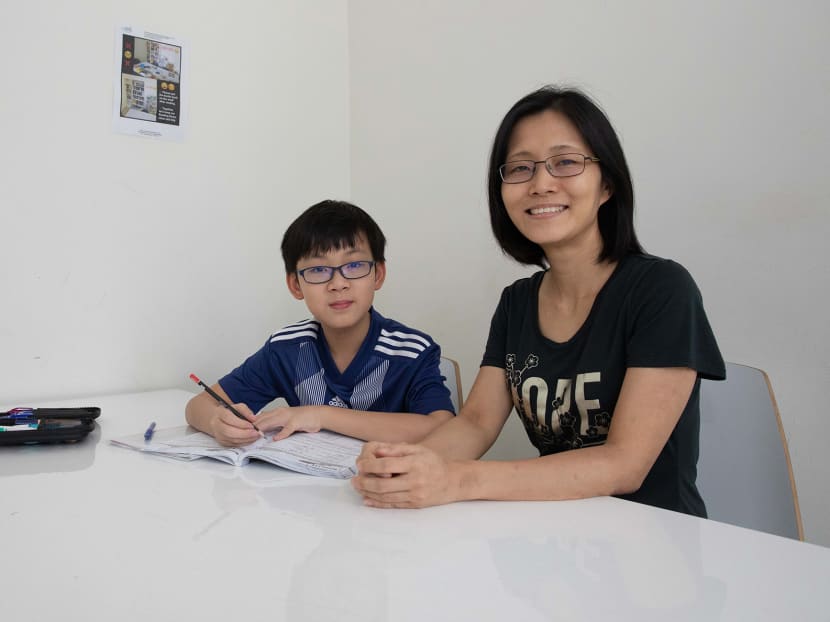
Before the pandemic, homemaker Angela (not her real name), 45, was already feeling the pressure of making sure her son could qualify for a top Integrated Programme (IP) school.
That meant enrolling her son for multiple tuition and enrichment classes and adhering to a strict revision schedule to hit the 260 to 262 T-score goal that they had set together.
On most days, Angela shared that her son would eat his lunch and change in the car so that he could race to tuition class after he was released from school.
A typical day for him would start at 6.30am, when he would wake up for school. After school, he would attend a tuition class from 3pm to 5pm, before heading to another one from 7.30pm to 9.30pm.
From 9.30pm, he would do his own revision and pore over exam papers given by the school until around 11pm, when he would go to bed.
This schedule would be repeated on the weekends, but school hours were replaced with more personal revision, she said.
Ultimately, all the hard work bore fruit — her son got 272 for the PSLE and attained a spot in Raffles Institution.
Angela, who is a Chinese national married to a Singaporean, said a lot of her stress stems from cultural beliefs back in China, where children are under even greater academic pressure than they are here.
Such beliefs are difficult to shake off even though she has lived here for a decade, she said.
QUALMS ABOUT NEW SCORING SYSTEM
While the likes of Angela, Ms Chen and Ms Tan are relieved to see the back of the PSLE, parents of pupils taking the Pri 6 exams next year expressed concerns that the new scoring system may create more, not less, stress for them and their children.
One point of contention which came up repeatedly during TODAY’s interviews with parents is the belief that the AL scoring system favours all-round pupils while putting those with clear strengths and weaknesses at a disadvantage.
For example, a student who does poorly in one subject may end up with an overall “poorer” score even though he or she has done better in the other three PSLE subjects.
Then, there is also the worry that the AL system may result in even greater competition to get into some of the more popular secondary schools, as the smaller range of possible PSLE scores might lead to more clustering of cut-off points across secondary schools.
For Ms Carrie Ng, 41, her concern over the new scoring system deepened after her 11-year-old son Bryan in Pri 5 received his end-of-year report card this year, which had his grades indicated as ALs to familiarise parents and pupils with the new PSLE scoring system.
Though her son usually performs well in school, he received a poorer than expected AL score because the AL bands are narrower at the top of the score system.
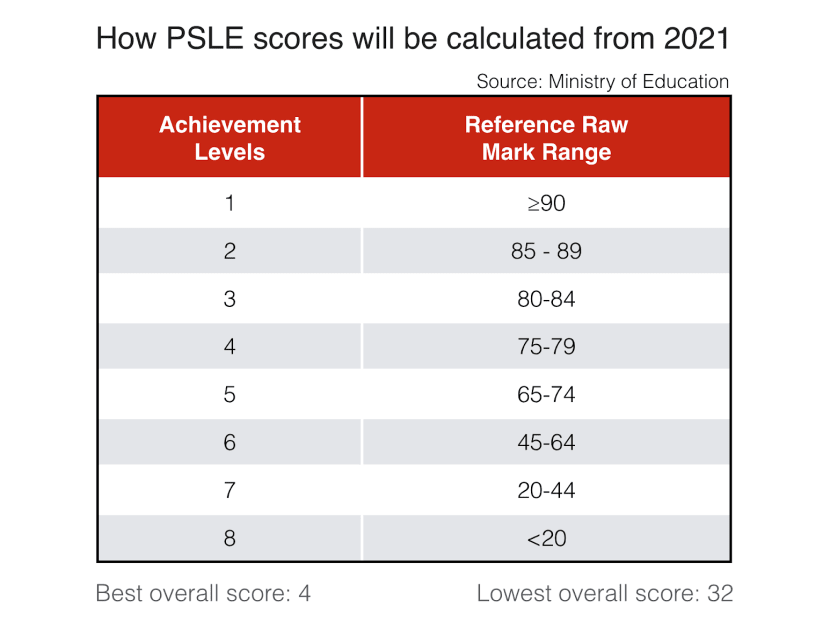
Ms Ng hopes that Bryan can qualify for an IP school next year but his Pri 5 simulated score would not be good enough. And this set off some alarm bells within the household.
“We were pretty shocked,” said Ms Ng, who works in the logistics sector.
She added: “The benefit of the T-score system is that it takes into account every subject… so the stronger subjects can really pull up your whole score. (But with the AL system), you can easily slide into a lower band.”
In light of this, Ms Ng has chosen to sign her son up for English writing classes as languages are his weaker subjects. This is something that she would not have done had the T-score system remained in place for next year’s PSLE, she said.
These sentiments were echoed by Gwen Seah, 11, who will be among the first batch of pupils taking the PSLE under the new system. She, too, felt that it “can be unfair” and “favours all-rounders”.
“It’s harder for those who are only good in one or two subjects,” said Dylan Seah, her 12-year-old brother who sat for the PSLE this year.
PRESSURE OF GETTING INTO TOP SEC SCHOOLS REMAIN
Ms Gina Low, 46, is the mother of Dylan and Gwen,
With her son being in the final batch of students under the old scoring system and her daughter among the pioneers of the new one, she does not think the change will make too much of a difference as the stress for parents and students ultimately comes during the school selection process.
“Frankly, at the end of the day, the drive to go to the top schools is still there,” she said.
With a smaller range of scores under the AL system, there would potentially be more students applying for the same popular schools, she added.

Under the new scoring system, MOE said a new “tie-breaker” of choice order of schools has been introduced for pupils with identical PSLE scores vying for places in a particular school.
This means a student who picks the school higher in his or her list of six will have priority.
How the new scoring system will affect the school selection process is also a top concern for Ms Desiree Yaw, whose 11-year-old son will be taking the PSLE next year.
Though the 43-year-old business research assistant believed that the new scoring system will place less stress on pupils, she felt the wider banding makes it difficult to judge which secondary schools would be best suited for her son’s capabilities.
Under the T-score system, pupils were more clearly differentiated in terms of their scores and the different standards of the schools were also indicated by specific cut-off points.
“But with the banding, (it’s not clear where he would stand compared to his peers) and I am not sure which school I should choose for him,” said Ms Yaw.
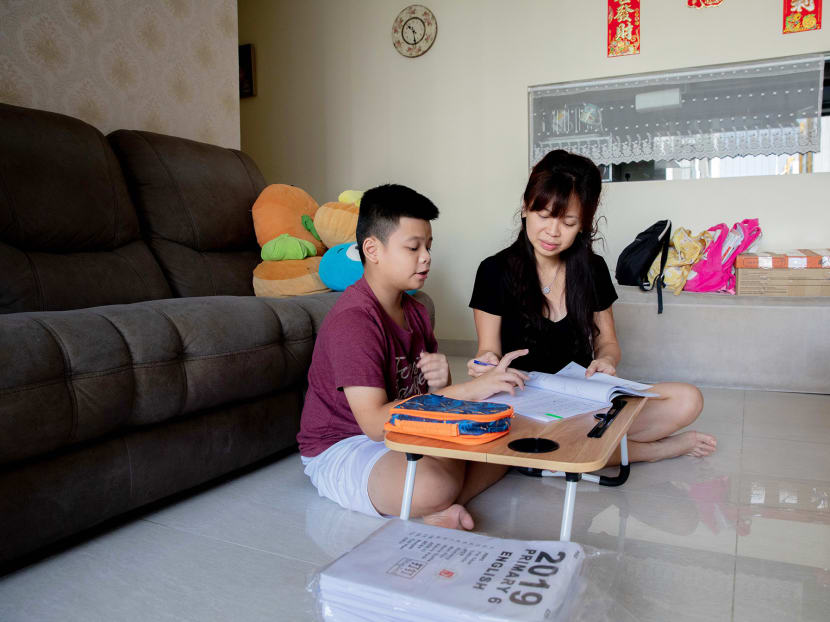
Separately, some parents and educators have also voiced concerns over how the banding of grades makes it harder for Foundation students to move up to the Express stream if they take two or more Foundation-level subjects.
Under the new system, Foundation subject grades will be placed into three broader bands — AL A, AL B and AL C. At the PSLE level, AL A is equivalent to AL6, AL B to AL7, and AL C to AL8.
To enter the Express stream, pupils will need to have an AL score of 4 to 22.
NEW SYSTEM REDUCES UNHEALTHY COMPETITION: TEACHERS
Still, there were parents who welcomed the new system and believed that it will take time for the benefits to be truly felt.
One parent, Dr Chinnu Palanivelu, 43, said: “Overall, the change is a good move because a student’s score will not be affected by other students’ performance.”
“Hopefully, once it’s implemented and things get started, then there will be a consensus,” added the managing partner at Stamford Assurance.
Educators whom TODAY interviewed also believed that the revamp will help to alleviate some PSLE-related pressures. They cannot be identified as they are not authorised to speak to the media.
One Pri 5 science teacher said: “Especially in the best class, students always want to be the best. You have children crying because they are one mark away from a full score.”
With the new AL system, such scenarios are less likely to happen as students do not know their exact scores. This helps to reduce unhealthy competition and stress, he added.
Though he acknowledged that the uncertainty of the new school selection process can lead to “real fear” for parents and students, the Pri 5 teacher believed the new system would force them to think very carefully about their choice and ranking of schools — for instance, by looking at co-curricular and leadership opportunities — instead of “blindly putting emphasis” on academic scores.
Agreeing, Mr Darryl David, deputy chairman of the Government Parliamentary Committee (GPC) for Education, said the main advantage of the new scoring system is that it does not go down to the granular detail of every single mark, which leads to an ultra competitive culture.
He noted that this new way of banding scores together is akin to the way secondary school students are graded in the GCE O-Level examinations, where students are also given an overall aggregate score rather than an absolute number.
“In that regard, I think (the new PSLE scoring system) is something that we are quite familiar with,” said Mr David, who is a Member of Parliament (MP) for Ang Mo Kio Group Representation Constituency.
Mr Patrick Tay, chairman of the GPC for Education, noted that improvements can still be made to the new system, but a first run will be needed to see where the gaps lie.
“We need to let the first batch run its course and then tweak accordingly, especially since there are subjective elements such as the choices which parents or students make for their secondary school admission,” said Mr Tay, who is an MP for Pioneer Single Member Constituency.
The Pri 5 Science teacher disagreed that the AL system favours all-rounders.
Even with the T-score system, it was difficult to pull up a pupil’s overall score if the pupil is particularly weak in one or more subjects to the point of failing, he said.
He added that in fact, the new system might actually reduce the stress on students when it comes to their weaker subjects because the AL5 and AL6 bands are wider.
However, another Pri 5 English teacher acknowledged that such concerns are valid, and that some parents might send their kids for extra lessons to compensate for weaker subjects.
“Education is supposed to give everybody equal footing,” she said. “But the richer can afford to have all these extra lessons, so they are moving up higher and faster.”
As for Foundation-level students, the English teacher said some parents of such students have actually welcomed the change.
These parents are generally not too concerned about the cap of AL A (equivalent to AL6) for Foundation-level subjects, as they already know that their child is most likely to enter the Normal Technical stream in secondary school, she added.
In fact, the parents are “very happy” and “more relaxed” as their children are happier, she said, partly because achieving a passing score of AL B — or a minimum of 30 marks — in their Pri 5 exams this year boosted the students’ morale.
She added that she can now afford to focus less on the students’ academic grades and more on helping them understand concepts, and incorporating storytelling and life skills into her lessons.
“Teaching is less stressful,” she said. “I can concentrate on teaching, and not be so calculative.”
In its previous reply to TODAY addressing these concerns, MOE had said that students taking Foundation-level subjects are still eligible for Express, Normal Academic or Normal Technical courses as they qualify based on their overall PSLE scores, and that individual subjects do not directly affect which stream the student is admitted to.
‘UP TO PARENTS TO EMBRACE CHANGE’
Whether the new scoring system achieves its intended outcome depends on how parents react to the changes starting next year, said the Pri 5 Science teacher.
Much of the stress and pressure does come from peers and parents, noted Australian national John McGrath, who had his first encounter with the Singapore educational system when his 12-year-old daughter Kirana took the PSLE this year.
“I’m definitely not used to 12-year-olds being under so much pressure here,” said the 49-year-old finance director, who has been a permanent resident in Singapore for more than two decades.

Education experts and MPs whom TODAY spoke to reiterated that ultimately, parents have a key role to play in bringing about improvements to the system.
After all, no amount of changes will bring about a perfect educational system, said Mr David, as any system will have its own set of challenges and concerns.
“Pressure, worry, stress is what we feel. It’s how we react to the system that determines our level of stress,” said the Ang Mo Kio GRC MP.
He added: “As parents we have a job to also help manage the impact of the system and filter the stress of the system for our children.”
A major overhaul of the system will not be so easy if parents stick to their own beliefs based on their prior expectations and experiences with the old system, said Dr Jason Tan, associate professor of policy, curriculum and leadership at the National Institute of Education.
While some parents take a more laissez faire approach, others with high aspirations might engage in “high-stakes planning” to ensure that their children get into top schools, he noted.
“(This new scoring system) is part of the move to bring across the idea that there are different pathways in the education system,” he said. “There can be a variety of pathways, but for some (parents), there is a clear and definite hierarchy.”
He added: “As long as this kind of thinking endures, there will still be some parents and students going all out to access what they believe to be more prestigious pathways.”
Dr Ho Boon Tiong from educational training and consulting firm ClassPoint Consulting suggested that parents discuss with their children how to monitor their learning and develop their interests as well as how to choose secondary schools, rather than simply focusing on their academic performances.
Mr David called on parents to see the revamp as a “blank canvas” — an opportunity to cast aside the baggage of the old scoring system.
“Starting with the new system perhaps allows us to recalibrate and reassess how we view this creature concept of the PSLE and how we make our choices for post-PSLE education,” he said.
On the whole, Mr Tay said the PSLE revamp also needs to be viewed together with the new subject-based banding system that has been introduced in secondary schools. The new banding system allows students to take subjects at a higher or lower level based on their strengths.
“(These changes have been made) so that each and every student can realise his or her full potential without compromising on interests, passions and strengths,” added the Pioneer MP.
Agreeing, Dr Ho said: “I think (parents) have to set realistic expectations for themselves. It means (having) to redefine what it means to be successful in education.”
Indeed, judging by TODAY’s interviews with parents and their children, more often than not, it is the adults who appear to be more anxious than their kids taking the exam.













